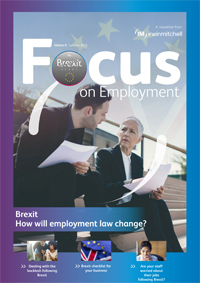The result of the referendum has
revealed that we are a divided nation:
divided by region, divided by age and
divided by education and wealth.
As the UK struggles to
pick up the pieces and
forge a way forward,
voters have turned
on one another. Calls
for both sides to work
together have largely
fallen on deaf ears and
social media is awash
with vitriolic comments,
name-calling and abuse.
What should employers do if such
polarised views spill out into the
workplace?
Employees are entitled to a private life and
to hold opinions that their employers and
others with whom they work do not agree
with, but this does not mean that they have
an absolute right to say what they like. Most
employers have workplace policies and rules,
which spell out the behavioural standards
staff must meet. These will usually require
staff to treat each other with dignity and
respect. Calling a colleague a “moron” (or
worse) for voting a different way, ridiculing
them for their “mistaken” beliefs or clearing
the desk of an EU worker “as a joke” will cause
problems and may amount to bullying and
potentially discrimination.
Under UK law, an individual can complain
of bullying or harassment if comments
are “unwanted” and create a hostile or
intimidating working environment. Generally,
you take your victim as you find them and it
is not a defence to say that the comments
were “banter” or that the victim is too
sensitive or that the comments were not
directed at them.
Employers have a duty to dampen down any
conflict in their workplace and should remind
staff to respect each other’s opinions and
not allow their own political/philosophical
opinions to affect their work or the
relationships they have with their colleagues.
If problems arise, you must take swift
and effective action to prevent problems
escalating.
If you have undertaken thorough diversity
training, your workforce should recognise
that making derogatory comments about an
individual or a group of people based on their
nationality, race or philosophical beliefs is
likely to get them into trouble (and in serious
cases may result in dismissal). However, they
may not necessarily consider that teasing
someone for holding different political beliefs
may also amount to bullying and you may
therefore have to spell this out.
Is a belief in the EU or sovereignty of the
UK a protected belief?
A belief in the EU or alternatively the
sovereignty of the UK might be capable
of being a “philosophical belief” protected
under UK discrimination law. Whilst a “belief”
has to be more than simply an opinion,
employees who believe that they have been
bullied for holding a contrary view on Brexit
to the majority of their colleagues, may try
and bring claims based on their beliefs if
no action is taken to protect them. Previous
cases have found that a belief in climate
change, anti-fox hunting and left wing
democratic socialist beliefs have all been held
to be capable of protection.
Protecting the business from claims
Organisations will only avoid liability for
harassment and bullying carried out by their
staff if they can demonstrate that they
have taken all reasonable steps to prevent it.
Whilst bullying is not a legal claim in its own
right (unless it amounts to harassment as the
bullying is discriminatory), it can amount to
a potential fundamental breach of contract
giving rise to potential constructive dismissal
claims, if the employer fails to take action
and, for example, the employee loses all
trust and confidence in their employer to
deal with matters or provide a safe system of
work. Whilst a policy will help, you must also
demonstrate that you have trained staff and
dealt with all incidents appropriately.
Protecting your staff from abuse from the
public
In the week following the referendum there
was a dramatic increase in reported racist
attacks and hate crimes and businesses in
some areas of the UK have already reported
that staff recruited from outside the UK (and
in some cases outside the EU) have been
abused or threatened by customers or other
members of the public.
Employers have a duty to protect the health,
safety and welfare of their employees and
must do whatever is reasonably practicable
to achieve this. This means making sure that
workers are protected from anything that
may cause harm, effectively controlling any
risks to injury or health that could arise in the
workplace. Lone workers may be particularly
at risk and they should be provided with basic
safety training and support.
Summer 2016
Download Summer 2016 issue (pdf)
For general enquiries
0808 291 3524
Or we can call you back at a time of your choice
Our opening hours are Monday to Friday 8am to 6pm (excluding Public Holidays).
